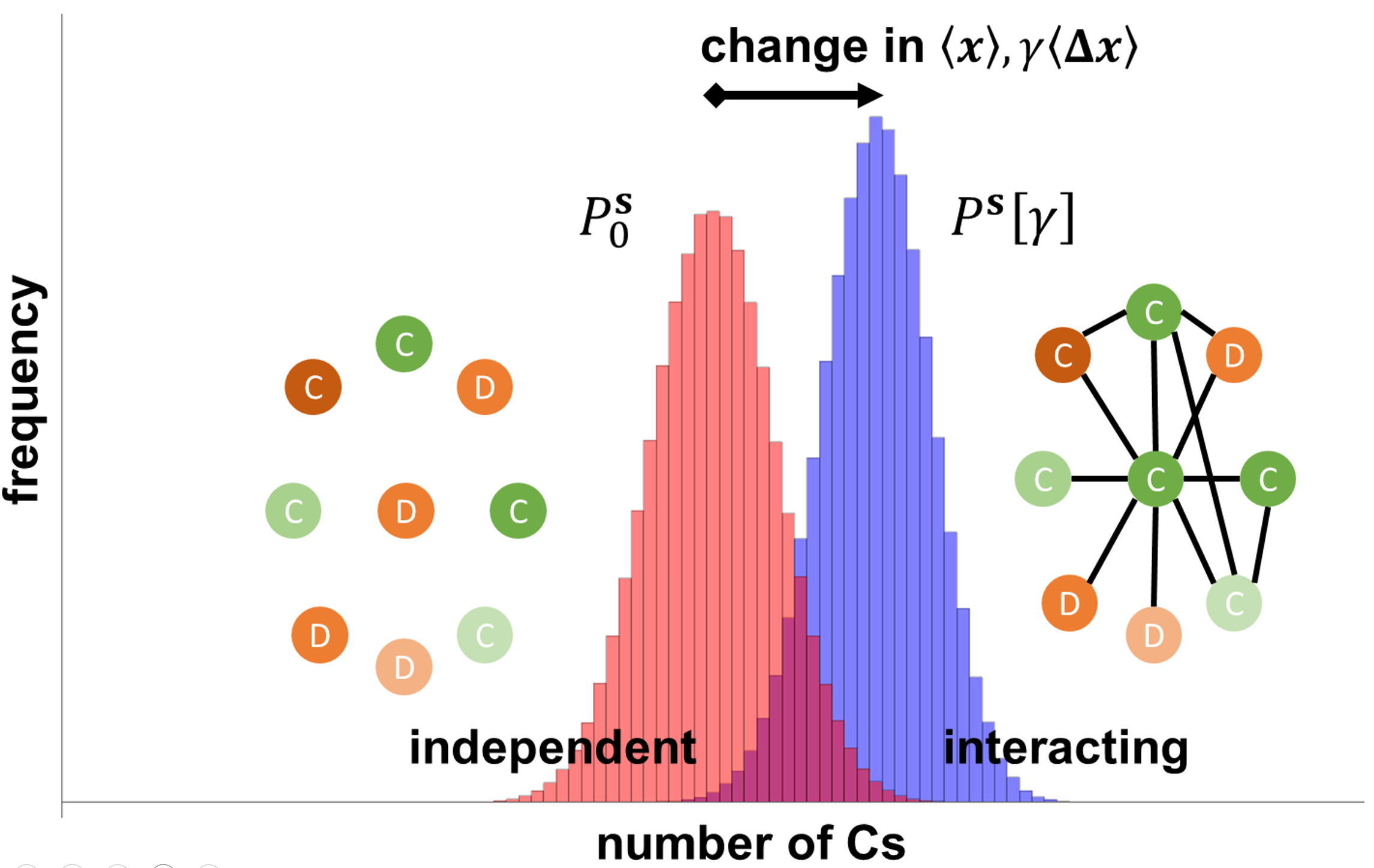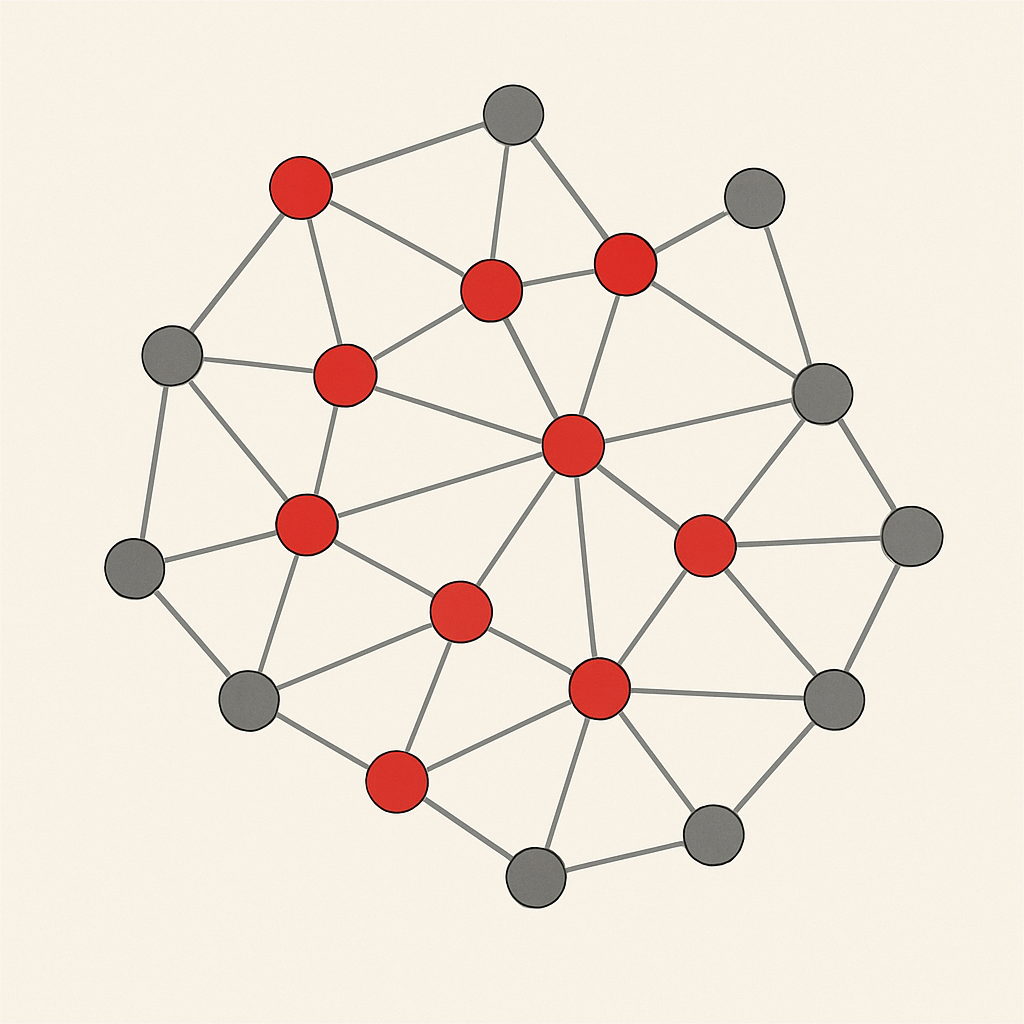Publications
2025
-
 Social influence on complex networks as a perturbation to individual behaviorDhruv Mittal, Flávio L. Pinheiro, and Vıtor V VasconcelosarXiv preprint arXiv:2509.17948, Sep 2025
Social influence on complex networks as a perturbation to individual behaviorDhruv Mittal, Flávio L. Pinheiro, and Vıtor V VasconcelosarXiv preprint arXiv:2509.17948, Sep 2025Cooperation is fundamental to the functioning of biological and social systems in both human and animal populations, with the structure of interactions playing a crucial role. Previous studies have used networks to describe interactions and explore the evolution of cooperation, but with limited transposability to social settings due to biologically relevant assumptions. Exogenous processes – that affect the individual and are not derived from social interactions – even if unbiased, have a role in supporting cooperation over defection, and this role has been largely overlooked in the context of network-based interactions. Here, we show that selection can favor either cooperation or defection depending on the frequency of exogenous, even if neutral, processes in any population structure. Our framework allows for deriving analytically the conditions for favoring a specific behavior in any network structure strongly affected by non-social environments (frequent exogenous forcing, FEF), which contrasts with previous computationally prohibitive methods. Our results demonstrate that the requirements for favoring cooperation under FEF do not match those in the rare-mutation limit, establishing that underlying neutral processes can be considered a mechanism for cooperation. We reveal that, under FEF, populations are less cooperative, and network heterogeneity can provide an advantage only if targeting specific network properties, clarifying seemingly contradictory experimental results and evolutionary predictions. While focused on cooperation, our assumptions generalize to any decision-making process involving a choice between alternative options. Our framework is particularly applicable to non-homogeneous human populations, offering a new perspective on cooperation science in the context of cultural evolution, where neutral and biased processes within structured interactions are abundant.
-
 Targeted incentives for social tipping in heterogeneous networked populationsDhruv Mittal, Fátima González-Novo López, Sara M Constantino, and 3 more authorsarXiv preprint arXiv:2501.13623, Jan 2025
Targeted incentives for social tipping in heterogeneous networked populationsDhruv Mittal, Fátima González-Novo López, Sara M Constantino, and 3 more authorsarXiv preprint arXiv:2501.13623, Jan 2025Many societal challenges, such as climate change or disease outbreaks, require coordinated behavioral changes. For many behaviors, the tendency of individuals to adhere to social norms can reinforce the status quo. However, these same social processes can also result in rapid, self-reinforcing change. Interventions may be strategically targeted to initiate endogenous social change processes, often referred to as social tipping. While recent research has considered how the size and targeting of such interventions impact their effectiveness at bringing about change, they tend to overlook constraints faced by policymakers, including the cost, speed, and distributional consequences of interventions. To address this complexity, we introduce a game-theoretic framework that includes heterogeneous agents and networks of local influence. We implement various targeting heuristics based on information about individual preferences and commonly used local network properties to identify individuals to incentivize. Analytical and simulation results suggest that there is a trade-off between preventing backsliding among targeted individuals and promoting change among non-targeted individuals. Thus, where the change is initiated in the population and the direction in which it propagates is essential to the effectiveness of interventions. We identify cost-optimal strategies under different scenarios, such as varying levels of resistance to change, preference heterogeneity, and homophily. These results provide insights that can be experimentally tested and help policymakers to better direct incentives.
-
 Policy, Risk, and Norms Shape Collective Behaviors WorldwideDhruv Mittal, Sara M Constantino, Simon A Levin, and 3 more authorsarXiv preprint arXiv:2508.15098, Aug 2025
Policy, Risk, and Norms Shape Collective Behaviors WorldwideDhruv Mittal, Sara M Constantino, Simon A Levin, and 3 more authorsarXiv preprint arXiv:2508.15098, Aug 2025Societal responses to environmental change vary widely, even under comparable shocks, reflecting differences in both policy measures and public reactions shaped by cultural and socioeconomic contexts. We examine mask-wearing dynamics across 47 countries during the COVID-19 pandemic using a process-based, utility-driven model of individual behavior with three evolving drivers: policy stringency, disease risk, and social norms to understand emergent collective behavior. Calibrated with daily data on mask usage, COVID-19 deaths, and policy mandates, the model reproduces diverse national trajectories with minimal complexity. Differences in the decision weights assigned to policy and norms are critical for explaining variation, while risk and policy weights correlate with cultural and socioeconomic indicators. Norm weights, by contrast, are distributed more evenly across contexts. Our findings demonstrate how mechanistic models can uncover the processes shaping collective behavior, enabling policymakers to anticipate the magnitude and timing of behavioral change and design more effective, context-sensitive interventions.
2024
-
 Anticonformists catalyze societal transitions and facilitate the expression of evolving preferencesDhruv Mittal, Sara M Constantino, and Vítor V VasconcelosPNAS Nexus, Jul 2024
Anticonformists catalyze societal transitions and facilitate the expression of evolving preferencesDhruv Mittal, Sara M Constantino, and Vítor V VasconcelosPNAS Nexus, Jul 2024The world is grappling with emerging, urgent, large-scale problems, such as climate change, pollution, biodiversity loss, and pandemics, which demand immediate and coordinated action. Social processes like conformity and social norms can either help maintain behaviors (e.g. cooperation in groups) or drive rapid societal change (e.g. rapid rooftop solar uptake), even without comprehensive policy measures. While the role of individual heterogeneity in such processes is well studied, there is limited work on the expression of individuals’ preferences and the role of anticonformists—individuals who value acting differently from others—especially in dynamic environments. We introduce anticonformists into a game-theoretical collective decision-making framework that includes a complex network of agents with heterogeneous preferences about two alternative options. We study how anticonformists’ presence changes the population’s ability to express evolving personal preferences. We find that anticonformists facilitate the expression of preferences, even when they diverge from prevailing norms, breaking the “spiral of silence” whereby individuals do not act on their preferences when they believe others disapprove. Centrally placed anticonformists reduce by five-fold the number of anticonformists needed for a population to express its preferences. In dynamic environments where a previously unpopular choice becomes preferred, anticonformists catalyze social tipping and reduce the “cultural lag,” even beyond the role of committed minorities—that is, individuals with a commitment to a specific cause. This research highlights the role of dissenting voices in shaping collective behavior, including their potential to catalyze the adoption of new technologies as they become favorable and to enrich democracy by facilitating the expression of views.
2023
-
 Rate-Induced Transitions in Networked Complex Adaptive Systems: Exploring Dynamics and Management Implications Across Ecological, Social, and Socioecological SystemsVı́tor V Vasconcelos, Flávia Marquitti, Theresa Ong, and 8 more authorsarXiv preprint arXiv:2309.07449, Jul 2023
Rate-Induced Transitions in Networked Complex Adaptive Systems: Exploring Dynamics and Management Implications Across Ecological, Social, and Socioecological SystemsVı́tor V Vasconcelos, Flávia Marquitti, Theresa Ong, and 8 more authorsarXiv preprint arXiv:2309.07449, Jul 2023Complex adaptive systems (CASs), from ecosystems to economies, are open systems and inherently dependent on external conditions. While a system can transition from one state to another based on the magnitude of change in external conditions, the rate of change – irrespective of magnitude – may also lead to system state changes due to a phenomenon known as a rate-induced transition (RIT). This study presents a novel framework that captures RITs in CASs through a local model and a network extension where each node contributes to the structural adaptability of others. Our findings reveal how RITs occur at a critical environmental change rate, with lower-degree nodes tipping first due to fewer connections and reduced adaptive capacity. High-degree nodes tip later as their adaptability sources (lower-degree nodes) collapse. This pattern persists across various network structures. Our study calls for an extended perspective when managing CASs, emphasizing the need to focus not only on thresholds of external conditions but also the rate at which those conditions change, particularly in the context of the collapse of surrounding systems that contribute to the focal system’s resilience. Our analytical method opens a path to designing management policies that mitigate RIT impacts and enhance resilience in ecological, social, and socioecological systems. These policies could include controlling environmental change rates, fostering system adaptability, implementing adaptive management strategies, and building capacity and knowledge exchange. Our study contributes to the understanding of RIT dynamics and informs effective management strategies for complex adaptive systems in the face of rapid environmental change.